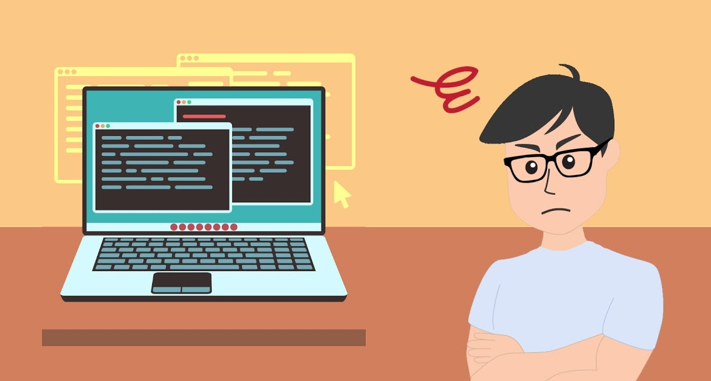Congratulations on securing your spot in the BCA or Bachelor of Computer Applications program at SMS Varanasi. While we do our best to prepare you for the top IT careers, we see that year after year, our first-year students face some common problems that can be easily alleviated if you do some advanced preparation.
So, before you dive headfirst into coding and complex algorithms your BCA program wants you to explore, let us discuss the problems students face and how to prepare to tackle them before the session starts.
Most Common Problems Bachelor of Computer Applications Students Face in the First Year

Based on the curriculum and the skills needed to succeed, here are some of the most common challenges BCA students face in the first year of college regarding academics:
- Difficulty with Programming: Programming is a core skill in the Bachelor of Computer Applications, and for many students, it’s entirely new. Grasping syntax, logic structures, and debugging code can be a significant hurdle in the first year.
Courses like ‘Programming in C or Python’ can be challenging for those without prior coding experience.
- Weak Mathematical Foundation: A strong understanding of mathematics is crucial for computer science. Students who struggle with concepts like algebra, trigonometry, or basic calculus in 10+2 might find themselves falling behind in courses like ‘Fundamental of Mathematics’, ‘Statistical Methods’, or ‘Discreet Mathematics’.
- Transitioning from Rote Learning to Analytical Thinking: The shift from rote learning in high school and intermediate to the analytical thinking required in BCA can be challenging. Students might struggle with problem-solving approaches, breaking down complex problems, and applying logical reasoning.
- Adapting to the Pace of the Program: The BCA program covers a lot of ground in a short time. Students might find it difficult to keep up with the pace of lectures, assignments, and practical sessions, especially if they haven’t developed strong time management skills.
- Juggling Technical and Non-Technical Subjects: The BCA program balances technical subjects like ‘Operating Systems’ and ‘Data Structures’ with non-technical subjects like ‘Soft Skills’ and ‘Entrepreneurship and Innovation’. Students might struggle to manage their workload effectively, especially if they haven’t developed good study habits for diverse subjects.
In addition to these academic challenges, students might also face issues with:
- Understanding Technical Jargon: Professors might have regional accents or use technical terms unfamiliar to new students. If you are new to Varanasi, you might take some time to adjust to the new lingo.
- Lab Environment: Adjusting to a lab environment with new software and hardware can be overwhelming for some students.
- Peer Pressure and Competition: The competitive nature of IT programs can lead to pressure and anxiety, especially for students who are new to the field.
What to Do to Overcome These Challenges?

Before starting college, we advise the students of the Bachelor of Computer Applications program to do the following:
Strengthen Your Math Skills:
- Review math concepts in 10+2: Brush up on algebra, trigonometry, and basic calculus. There are many online resources, textbooks, and refresher courses available or you can just turn to your school textbooks for it.
- Practice problem-solving: Look for online resources or math workbooks with practice problems to hone your analytical thinking skills.
Get a Head Start on Programming:
- Learn the basics of a programming language: Many online tutorials and courses offer introductions to popular languages like Python or C. Even a basic understanding will give you a head start in your BCA program’s introductory coding courses.
- Practice basic coding challenges: There are many websites with online coding challenges for beginners. This will help you get comfortable with the syntax, logic structures, and basic debugging techniques.
Develop Strong Study Habits:
Alt: Master study skills you will need in college
- Learn time management skills: If you have not done this in school already, create a study schedule and stick to it. Allocate enough time for each subject, including technical courses, non-technical subjects, and practical sessions.
- Practice active learning: Don’t just passively read textbooks. Take notes, ask questions in class, and actively participate in discussions. Many articles and apps are available to help you master the study skills you will need in college.
Boost Your Computer Literacy:
- Familiarise yourself with computer hardware: If you have joined a BCA program, learn about basic components like CPU, RAM, hard drives, and their functions. Knowing the basics can go a long way in making the transition easier for you.
- Explore common operating systems: Get comfortable with navigating Windows or Linux operating systems.
- Learn basic productivity software: Applications like Microsoft Word, Excel, and PowerPoint will come in extremely handy while doing projects in college. And many YouTube videos are available where you can pick up these skills for free.
Prepare for the Shift in Learning Style:
- Practice analytical thinking: Look for online puzzles, riddles, or logic games that challenge you to think critically and break down problems into steps.
- Develop strong communication skills: Practice explaining complex ideas clearly and concisely, both verbally and in writing.
Also, it may help you to:
- Connect with seniors: Talk to students who are already in the BCA program at your college. They can offer valuable insights into the curriculum, professors, and assignments!
- Explore online resources: Many websites and YouTube channels offer tutorials, lectures, and study guides specifically targeted towards BCA students. Explore them while you still have time.
By taking these proactive steps before starting college, BCA students can gain a significant advantage and be better prepared to tackle the academic challenges of the first year. Remember, a strong foundation and a commitment to learning will set you on the path to success in your BCA program and future IT careers you might choose.





